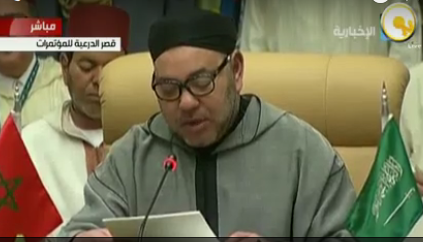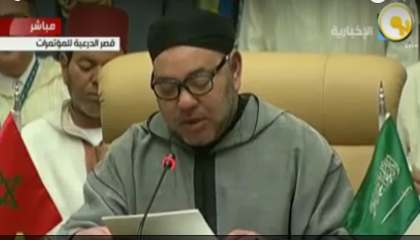
Morocco-GCC Summit Spurs Arab Unity & Action
 The participation of King Mohammed VI at the 1st summit meeting held in Riyadh April 20 between Morocco and the rich-oil Gulf Cooperation Council (GCC) countries confirms the status of the North African nation as a regional key player.
The participation of King Mohammed VI at the 1st summit meeting held in Riyadh April 20 between Morocco and the rich-oil Gulf Cooperation Council (GCC) countries confirms the status of the North African nation as a regional key player.
The summit comes at a time when the Arab world and particularly the six member States of the GCC bloc –Saudi Arabia, Kuwait, the United Arab Emirates, Qatar, Bahrain, and Oman– are facing huge security challenges and serious terror threats.
Relations between Morocco and Arab Gulf countries gained momentum thanks to the special ties King Mohammed VI has with all leaders of the GCC who invited in 2011 the North African kingdom to join the group. Jordan was also invited to the elite group in a move seeking to propel joint Arab action to counter common regional and international threats.
Although it is geographically remote from the hotspots rocking the Middle-East, Morocco has always supported Arab causes such as the Palestinian cause. King Mohammed VI is chairman of Al Quds Committee, the only body set up by the Organization of Islamic Cooperation (OIC) to defend the city and its holy sites.
In the final communiqué issued at the end of its summit held mid-April in Turkey, the OIC commended the efforts deployed by King Mohammed VI, Chairman of the Al-Quds Committee, to protect the Islamic and Christian holy sites in Al-Quds Ash-Shareef in the face of the measures being taken by the Israeli occupation authorities aimed and judaizing the holy city.
The Organization of Islamic Cooperation also underlined the need for the Ministerial Contact Group on Al Quds Al Sharif, under the chairmanship of the Kingdom of Morocco whose monarch chairs the Al- Quds Committee to continue its efforts and actions to contact influential international parties and to deliver the OIC message and demands regarding the city of al-Quds al-Sharif. It, therefore, reiterated the adoption of the Strategic Plan on the Development of al-Quds al-Sharif, and called on all Member States to provide financial resources necessary for its implementation.
Besides this recognized outstanding role played by Morocco in the defense of Islamic causes, Morocco’s diplomacy spearheaded by the Sovereign contributed to welding Arab ranks during the Arab Spring turmoil, enabling the Kingdom to expand its influence, gain new friends and new markets.
Morocco’s growing influence in the Arab world can thus be seen clearly in the Libyan crisis, as the Kingdom hosted the inter-Libyan talks that led to the adoption of the Libyan Political Agreement in December 2015. The agreement, providing for the Government of National Accord led by Fayez El Sarraj, was described by the UN and the international community as representing a unique opportunity to both address the immediate suffering of the Libyan people, build a democratic civil state through national consensus, and restore stability to this country wherein Daech is enhancing its presence, endangering the whole region.
Morocco’s role as a key partner was likewise evidenced in the Yemeni war as the North African country stood by its GCC allies to restore the legitimate authorities and elected government, overpowered by armed Houthi Shia militias, backed by Iran.
According to experts, the Morocco-GCC summit is an unprecedented, historical event as it is held for the first time at the level of heads of state, and represents an opportunity to contribute to cementing Arab ranks, at a time the Arab world is prey to divisions and strife.
The summit is most significant also because although Morocco-GCC relationship is longstanding and strong, the summit will usher in a new era in partnership between Rabat and the six-member powerful regional economic bloc, sharing common geostrategic, economic, and religious interests, in addition to the fact that Morocco and the GCC countries represent two poles of stabilization in the Arab world.
